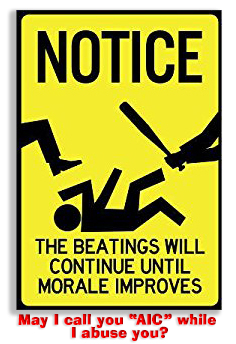- This topic is empty.
-
AuthorPosts
-
-
July 8, 2025 at 3:14 am #10175
Kris Marker
KeymasterWe post news and comment on federal criminal justice issues, with a primary focus on trial and post-conviction matters, legislative initiatives, and sentencing issues.
THE BEATINGS WILL CONTINUE…
 Time was, the joke went ‘the beatings will continue until morale improves.’ Now, it’s just ‘the beatings will continue…’
Time was, the joke went ‘the beatings will continue until morale improves.’ Now, it’s just ‘the beatings will continue…’Bureau of Prisons inmate Andrew Fields alleged that guards at USP Lee repeatedly assaulted him after restraining him and placing him in solitary confinement, including ramming his head into the concrete wall and attacking him with a security shield.
Arguing that the COs’ excessive force violated his 8th Amendment right to be free from cruel and unusual punishment, Andy sued under Bivens v. Six Unknown Named Agents of Federal Bureau of Narcotics, the 1971 Supreme Court ruling that permitted a man to sue for a 4th Amendment violation when federal agents performed a warrantless search of his home and then strip-searched him at a courthouse. Bivens established the right implied in the Constitution to sue government employees for violating individual constitutional rights.
By the time the 1980s came around, the Supreme Court started to have second thoughts about Bivens. Since then, the Court has left Bivens standing in name only. In 2017, for example, the justices ruled in Ziglar v. Abbasi that Bivens remedies apply only to unreasonable searches and seizures by federal agents rather than civil rights claims based on the conditions of confinement.
In 2022, SCOTUS limited Bivens further in Egbert v Boule. There, the Court ruled that Bivens could not apply to a claim if the case involved an “extension” of Bivens into a “new context” that is “different in a meaningful way from previous Bivens cases decided by this Court,” and whether “special factors… counsel hesitation about granting the extension.
For the “special-factors” analysis, the Egbert Court asked broadly whether judicial intrusion into a “given field” is inappropriate. The question was whether it was appropriate to imply a Bivens action should apply to Border Patrol agents generally. Because border protection implicates national security, the Court ruled, it was more appropriate to leave the authorization of any remedy to Congress.
While the facts in Andy’s case were disputed, the officers argued that they were carrying out their duties in a high-risk environment and that allowing lawsuits like this to proceed would open the door to constant litigation, potentially interfering with prison safety and discipline. Andy was thrown out of district court, which held that Ziglar and Egbert meant he could not sue BOP correctional officers just because they repeatedly kicked the crap out of him. But on appeal, the 4th Circuit disagreed, finding that no “special factors counseled against extending Bivens” to a case based on excessive force by prison guards.
 In last week’s unsigned opinion, the Supreme Court reinstated the District Court dismissal. “This case arises in a new context, and ‘special factors’ counsel against recognizing an implied Bivens cause of action for 8th Amendment excessive-force violations. To begin with, Congress has actively legislated in the area of prisoner litigation but has not enacted a statutory cause of action for money damages. In addition, extending Bivens to allow an 8th Amendment claim for excessive force could have negative systemic consequences for prison officials and the ‘inordinately difficult undertaking’ of running a prison. Moreover,” SCOTUS said, referring to the BOP administrative remedy system, “an alternative remedial structure already exists for aggrieved federal prisoners. The existence of such alternative remedial procedures counsels against allowing Bivens suits even if such procedures are ‘not as effective as an individual damages remedy.”
In last week’s unsigned opinion, the Supreme Court reinstated the District Court dismissal. “This case arises in a new context, and ‘special factors’ counsel against recognizing an implied Bivens cause of action for 8th Amendment excessive-force violations. To begin with, Congress has actively legislated in the area of prisoner litigation but has not enacted a statutory cause of action for money damages. In addition, extending Bivens to allow an 8th Amendment claim for excessive force could have negative systemic consequences for prison officials and the ‘inordinately difficult undertaking’ of running a prison. Moreover,” SCOTUS said, referring to the BOP administrative remedy system, “an alternative remedial structure already exists for aggrieved federal prisoners. The existence of such alternative remedial procedures counsels against allowing Bivens suits even if such procedures are ‘not as effective as an individual damages remedy.”Andy’s lawyer stated in a subsequent press release, “Forbidding courts from redressing a constitutional violation is wrong, and it is especially dangerous in this day and age to immunize federal executive officials from accountability for their actions.”
Goldey v. Fields, Case No. 24-809, 2025 U.S. LEXIS 2572 (June 30, 2025)
Reason, Federal Prison Guards Allegedly Beat an Inmate to a Pulp. The Supreme Court Says He Can’t Sue (July 3, 2025)
Thomas L. Root
-
-
AuthorPosts
- You must be logged in to reply to this topic.
